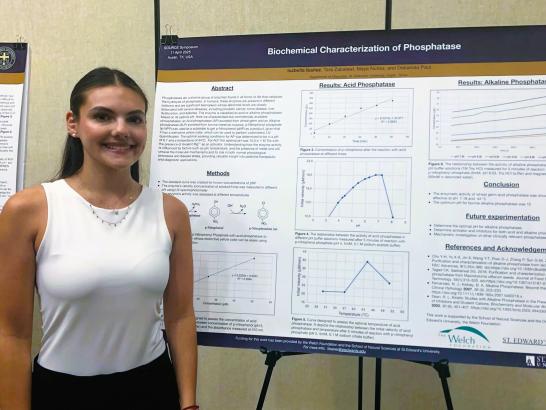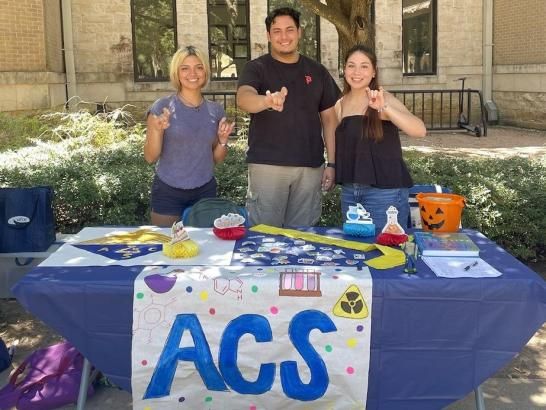Make a Difference in Biochemical Research and Medicine
Be part of the front lines in battling illness and infection by discovering how diseases work and conducting research to find a cure — or by helping your patients understand, improve and take care of their health.
Why earn your Biochemistry degree at St. Edward’s?
Whether you’re looking to enter medical or dental school or a graduate program in chemistry, biochemistry or pharmacology, one thing is certain: The advantages of your St. Edward’s education will prepare you to succeed. You’ll find opportunities in and outside the classroom to learn, give back and achieve your goals. And your mentors will support you every step of the way.
Build relationships with your professors
You’ll learn in small classes taught by dedicated professors who make a point of getting to know you and becoming your trusted advisors. They’ll help you identify and focus on your goals, and provide guidance and insight during and after your college years.

Conduct research
You’ll have the opportunity to engage in faculty-mentored research, present your work at professional conferences and submit your findings for publication.

Develop your career path as a chemist
Love chemistry but unsure what you would like to do with your degree? The Chemistry department’s annual guest speaker series connects you with professionals in the field. Learn firsthand from chemists in academia, industry and government agencies about their professional journey as a chemist. It’s an excellent opportunity to network and gain firsthand knowledge about the field. In addition, gain valuable experience as a teaching assistant for a laboratory course where you’ll enhance your benchwork, leadership and teamwork skills.

Get involved in The American Chemical Society student chapter
The American Chemical Society (ACS) student chapter on campus is a professional organization focused on enhancing student networking with professionals in the field, exploring careers in chemistry, and building a sense of community with people who love biochemistry as much as you do. The ACS student group works closely with the Department of Chemistry in coordinating its annual guest speaker series and volunteering for chemistry-focused community events.

Reap the Rewards of Austin
Austin is a fast-growing technology hub and emerging center of life-sciences research and innovation. As a Biochemistry major, you can explore career paths and practical application of your studies through internships and interactions within the greater Austin community.
What do our graduates do?
Biochemistry majors advance to a variety of careers and graduate and professional schools from St. Edward’s. Here’s a sample:
- Chemistry staff scientist at Vernier Software & Technology, after earning a PhD from the University of California at Davis
- Hospital pharmacist, after earning a PharmD from the University of Connecticut School of Pharmacy
- Psychiatrist, after earning an MD from The University of Texas Medical Branch in Galveston
- Postdoctoral associate at Harvard University
Explore Details About a Degree in Biochemistry
Major Requirements: The Bachelor of Science in Biochemistry requires 71 hours of major courses, which include a combination of chemistry, biology, math and physics courses.
General Education Requirements: In addition to the major program requirements, all students must satisfy the general education requirements. Talk with your success coach and faculty advisor about which courses are right for you.
View and download the full degree plan for Biochemistry.
What You Will Learn
You’ll learn to utilize chemical knowledge to study biological processes at the molecular level — including structure, function and regulation — applicable to everything from metabolic disorders to better understanding how chemicals promote or inhibit growth.
A few examples of courses students take in this major:
- Organic Chemistry II – Principles of designing multi-step synthesis schemes. Chemistry of aldehydes, ketones, carboxylic acids and their derivatives, aromatic compounds, amines, amides, and proteins.
- Biochemistry I – Survey of the fundamentals of biochemistry. Topics include the structure of proteins, nucleic acids, lipids and carbohydrates, catalysis, kinetics, bioenergetics, and information pathways. Gain an overview of the field through in-depth coverage of protein structure and enzyme catalysis.
- Cell Biology – Investigate the structure of the eukaryotic cell, the trafficking of macromolecules within cells, the mechanisms by which cell division is regulated, how cells communicate, and the biogenesis of cancer. The laboratory emphasizes current techniques utilized to study cell biology.
Skills You Will Gain
Upon completing the Biochemistry program, you’ll be ready to:
- Search, access, contextualize and effectively summarize readings of discipline-specific literature.
- Apply appropriate experimental techniques and instruments in the context of designing and executing an experiment.
- Use quantitative tools for data collection and analysis.
- Explain the purpose of general laboratory safety guidelines and their implementation in various lab settings.
- Communicate the findings of independent research in a manner appropriate to the audience, including oral presentations and the writing of experiments, research manuscripts, poster presentations, and research proposals.
- Demonstrate the ability to collaborate and arrive at a common goal within a team.
At St. Edward’s, our faculty are outstanding scholars, thought leaders, teachers and mentors who bring energy and enthusiasm to our vibrant learning community. They take pride in getting to know you, helping you achieve your goals and celebrating your successes.
View a list of our faculty members and their contact information on the Department of Chemistry webpage.
